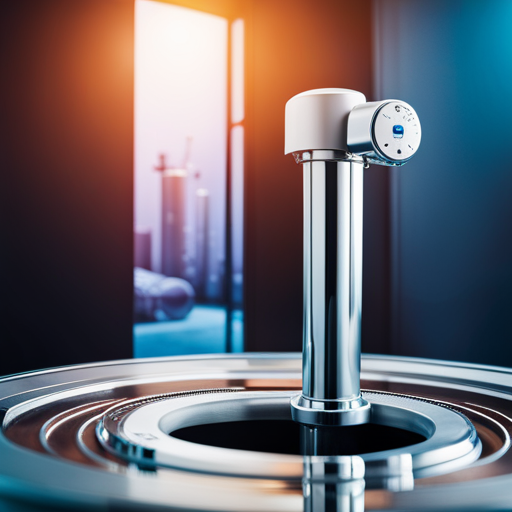Are you experiencing colored or poor-tasting water, low water flow, or an inability to generate soft water? These issues may be a result of improper drainage in your water softener unit.
Drain lines are a vital component of any water softener, as they prevent mineral buildup and damage to the system. Without proper drainage, you may experience costly repairs and damage to your unit’s resin.
In this article, we will explore the importance of drain lines for water softener units and discuss the different drain line options available for basement and outside units. Additionally, we will touch upon the significance of proper installation and clearing blockages in the drain line.
By the end of this article, you will have a better understanding of how drain lines protect your water softener and how to maintain them properly.
Key Takeaways
– Proper drainage is crucial for the efficient and effective functioning of a water softener unit, and can prevent costly repairs and damage to the resin.
– Choosing the right drainage option and having it installed by a professional plumber can avoid issues and ensure proper maintenance of the system.
– Troubleshooting tips can prevent common drain line mistakes that can lead to costly repairs and clean-up costs.
– Local regulations must be checked before choosing a drainage option, and options such as sump pumps, French drains, and dry wells may require more extensive installation and maintenance.
Importance of Drainage
You need to understand the importance of proper drainage for your water softener unit in order to prevent mineral buildup and damage to the system. Without proper drainage, minerals and other contaminants can accumulate in the resin, leading to colored water, poor taste, and lack of water flow.
In addition, the regeneration process can cause overflow and water damage if the drainage line isn’t functioning properly. There are many benefits of proper drainage for your water softener unit. It not only prevents mineral buildup and damage to the system, but also ensures that the machine functions efficiently and effectively.
However, common drain line mistakes, such as improper installation or failure to clear blockages, can lead to costly repairs and clean-up costs. Therefore, it’s important to choose the right drainage option for your unit and to have it installed by a professional plumber to avoid these issues.
Drain Line Options
Consider various options for where to route the wastewater from your water softener unit to prevent damage and ensure compliance with local regulations.
Sump pump installation can be a good option for basement units, as it allows for the easy disposal of wastewater without the need for a floor drain or sewage ejector pipe. However, it’s important to ensure that the sump pump is properly installed and maintained to prevent overflow and water damage.
Other options for outside units include connecting to a waste stack pipe or septic system drain fields, but it’s crucial to check local regulations before choosing a drainage option.
French drains and dry wells can also be effective, but may require more extensive installation and maintenance.
Ultimately, the choice of drainage option will depend on the specific needs and requirements of your water softener unit, as well as any local regulations that must be followed.
Maintenance and Installation
To properly maintain and install your water softener unit, it is important to follow the manufacturer’s instructions and hire a licensed plumber for installation. The drainage line plays a crucial role in the proper functioning of the unit, and any issues with it can lead to expensive repairs and damage to your system. Here are some common issues and troubleshooting tips to keep your drainage line in good condition:
| Common Issue | Troubleshooting Tip |
|---|---|
| Clogs in the drain line | Turn off the water softener and inspect the drain line for any blockages. Clear any debris with a plumbing snake or by flushing the line with water. |
| Overflow during regeneration process | Check that the drain line is properly installed and has an air gap to prevent contaminants from entering the water supply. If the issue persists, consider installing a larger drain line or adjusting the regeneration cycle. |
| Foul odors coming from the drain line | Pour baking soda and vinegar down the drain line and let it sit for 30 minutes. Flush the line with hot water to remove any buildup causing the odor. |
| Poor drainage | Check that the drain line is properly sloped and free from any obstructions. Consider installing a larger drain line or adjusting the regeneration cycle. |
By following these troubleshooting tips and ensuring proper installation of your drainage line, you can prevent any issues with your water softener unit and keep it functioning properly. Remember to consult your owner’s manual for detailed instructions and to hire a licensed plumber for any installation or repair needs.
Conclusion
Now that you understand the importance of drain lines for your water softener unit, it’s crucial to make sure you choose the right drain line option for your specific needs.
Whether you have a basement or outside unit, there are various options available that can provide the necessary drainage and prevent any potential damage to your system.
Remember to always prioritize proper installation and maintenance of your drain lines, as neglecting this can lead to costly repairs and damage to your water softener.
By taking the time to clear any blockages and ensure regular maintenance, you can protect your investment and enjoy clean, soft water for years to come.
With the right drain line in place and proper care, you can rest easy knowing that your water softener is functioning at its best.
